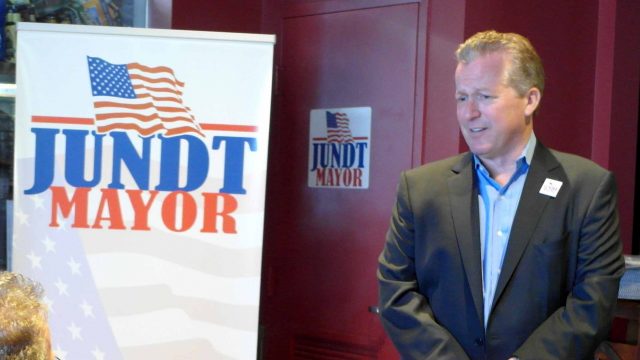A Taxpayer Owned Trailer Park?

The City of Williston is in the midst of a very ugly mayoral race (witness this kerfuffle over campaign signs). That’s maybe not surprising. The city is going through unprecedented changes thanks to booming oil and gas development, and there is a power struggle over who will chart the path for the city’s future.
But the quality of the candidates running for the position is suspect, to put it mildly. Case in point, one of the candidates just suggested that the government buy a trailer park where the private ownership has been jacking up rents.
I’m not kidding. He’s proposing a government-owned trailer park.
“What’s going on in this town needs to stop. It’s wrong,” said Marcus Jundt, mayoral candidate, to a group of citizens residing in the FM Trailer Court on Wednesday.
After a recent transition of ownership, the trailer court tenants were told lot rents will increase from $300 to $850 June 1. Many cannot afford the new rent, especially the elderly who rely on Social Security.
“You have an immediate crisis,” Jundt said at his open forum held at the Williston Brewing Company, where he provided free pizza and ideas to help curb landowners from raising rents.
His grandparents homesteaded in North Dakota and would be appalled at increasing lot rents, he said. Jundt reminded tenants the Williston City Commission recently approved a 1 percent tax on lodging and restaurants, which could generate $1.2 million per year. The commission board intends to use the money to address the lack of downtown parking.
“We have citizens being kicked out of the community, and we’re building parking garages,” Jundt said.
He would rather use the money to help the city purchase the trailer court and keep rents at a low cost, he said. If elected, he promised his first move of action will be to put this proposal before the board.
The trailer park in question has been championed by Barbara Vondell – a Democrat candidate for the state Senate from Williston – who has called for rent control in response to rising costs. As misguided as that sort of policy is – one way to hamstring housing development in western North Dakota is to threaten rent control – the government buying up property may be even worse.
How in the world is that feasible policy? How does the government buying up property solve a property that has been created by a housing shortage? And what if the owners don’t want to sell? Has Jundt even spoken to them? Is he proposing that the city expropriate the property to lower rents?
Jundt, I suspect, is guilty of some rank pandering on an emotional issue just days before election day, but it should be noted that Williston’s present leadership hasn’t exactly been handling the housing situation in a deft manner either.
“Officials in the heart of the North Dakota oil patch are continuing their efforts to rid the area of temporary housing,” reported the Associated Press back on February 8th, describing the decision by Williams County (Williston) to shoot down two permits for temporary housing.
“After month of behind-the-scenes work, Williams County has begun to initiate a plan to reduce the number of temporary housing units in the county,” reported the Williston Herald back in June of 2013.
Back in 2012, the City of Williston was pushing to ban so-called “man camps” which are temporary housing developments put together to house workers.
That same year Williston also cracked down on people living in RV campers in the city.
Given this driven bureaucratic assault on temporary housing, is it really any surprise that the area is now grappling with housing prices? The people who were in that temporary housing, or who would have been in that temporary housing, have been pushed into the market for permanent housing. That inflated demand for housing and, since supply has been slow to keep up, also inflated prices.
Rather than proposing government buy-outs of housing, why not explore ways in which housing demand can be met by the private sector?
Western North Dakota needs strong and thoughtful leaders, especially in this time of rapid social and economic growth. But judging by the present leadership in some of these communities, up to and including people like Jundt who would hold office, leadership is going to continue to be a problem for the foreseeable future.




